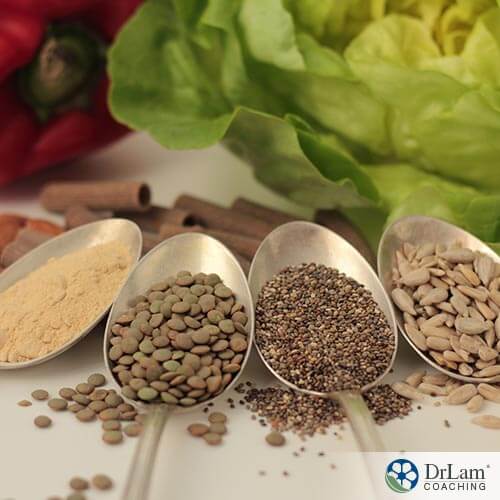Polycystic Ovary Syndrome affects hundreds of women every year. It causes a combination of troubling symptoms related to hormonal imbalances. It can also affect your fertility as well. Unfortunately, traditional methods for addressing this disorder can be ineffective at best and cause additional problems at worst. But there’s a more efficient way to reclaim your health with the polycystic ovary syndrome diet.
 Women who have polycystic ovary syndrome have an imbalance of reproductive hormones. Around 10 percent of women in the US have this disorder, although experts estimate that the actual number is closer to 25 percent.
Women who have polycystic ovary syndrome have an imbalance of reproductive hormones. Around 10 percent of women in the US have this disorder, although experts estimate that the actual number is closer to 25 percent.
When you have polycystic ovary syndrome, it means that your ovaries are producing too much testosterone and not enough estrogen. This imbalance is unnatural, and it may affect your ovulation. In some cases, it prevents the release of eggs, which then cluster around the ovaries and form cysts. Researchers aren’t sure why this type of imbalance occurs, but it can affect every aspect of your health.
Without estrogen, your metabolic system can become unbalanced. This will affect every part of your metabolism, including how your body processes insulin and the balance of bacteria in your gut. This can lead to insulin resistance, weight gain, and other issues related to how your body metabolizes your food.
The mechanisms behind this disorder aren’t fully understood. It may be caused by ovary dysfunctions, which then cause the associated symptoms and insulin resistance. However, it may also be the other way around. Insulin resistance may occur first, affecting the functioning of the ovaries and causing the overproduction of testosterone. More research is needed before this complicated relationship is fully understood.
The polycystic ovary syndrome diet can’t correct the ovarian dysfunction or completely eliminate this disorder. What it can do is reduce insulin resistance and decrease the symptoms of this disorder, allowing you to get on with your life.
Obviously, everyone is different and will experience this disorder differently. However, most women with polycystic ovary syndrome will experience at least two of the following symptoms:
These are usually symptoms that are used to identify this disorder. However, women who experience it also report that they struggle with weight issues, which causes problems like belly fat which doesn’t shift with dieting or exercise, joint pain, sleep apnea, and infertility.
If you visit a medical doctor with these symptoms, you will probably be given medications to try and correct the hormonal imbalances and help with insulin production and regulation. These can be helpful in some situations. However, medical experts agree that lifestyle changes can also have a positive impact on PCOS. That’s when the polycystic ovary syndrome diet can be very helpful. And if your hormones are unbalanced because of adrenal fatigue, lifestyle changes like this are gentle enough to improve your condition without causing additional stress.
Hormone imbalances are very common when you have Adrenal Fatigue Syndrome (AFS) because of Hormonal Circuit dysfunctions. Excess stress causes a higher than normal demand for cortisol, also known as the stress hormone. This hormone is produced by the adrenal glands as part of the NeuroEndoMetabolic (NEM) stress response, which activates during stressful times. When the NEM stress response is active for too long, as it often is in the busy modern world, adrenal fatigue can occur. If this situation isn’t reversed, the health of the adrenal glands can begin to degrade, and widespread circuit malfunctions will start to occur.
The adrenal glands are one of the three organs that make up the Hormonal Circuit along with the ovaries and the thyroid. These organs are closely intertwined, so when the adrenals start to fatigue and malfunction, the other two organs will do the same. This can create a downward spiral of increasing ill-health and imbalances throughout the body. Symptoms of Hormonal Circuit malfunctions can be particularly troubling and difficult to control. The natural balance of your hormones will be lost, which can lead to excess testosterone production and PCOS. This will cause thyroid malfunctions and worsen the adrenal fatigue, in turn making your AFS and Hormonal Circuit imbalances even worse.
Recovering from AFS and Hormonal Circuit imbalances can be a difficult process that requires a lot of trial and error. It’s essential that you work on alleviating adrenal fatigue as well as the accompanying circuit imbalances. A healthy diet, regular exercise, and healthy lifestyle changes are often an important part of this process. They will not only encourage weight loss, help fill nutritional gaps, and remove sources of stress, they may also help alleviate underlying conditions such as PCOS and insulin resistance.
This is where the polycystic ovary syndrome diet can help. It will not only improve your overall health by helping you lose weight and decrease insulin resistance; it may also reduce some of the symptoms of PCOS, which will reduce your stress levels and encourage a more natural balance in the organs of your Hormonal Circuit.
A polycystic ovary syndrome diet will help you to maintain a healthy weight, improve the way your body processes glucose and decrease inflammation. Women with PCOS often have chronic, low-grade inflammation due to gut inflammations and other sources of ill health. Improving your diet will help to reduce the problems associated with PCOS and your symptoms.
Just be aware that this won’t alleviate the hormonal imbalances or correct your PCOS. This is a complicated disorder, and you will need to work with a medical professional to correct it.
Here’s what you should eat on a healthy, polycystic ovary syndrome diet:

This will help to lower your insulin levels and provide your body with antioxidants to lower inflammation. It will also encourage a healthier balance of good and bad bacteria in your gut. Fiber-rich foods include:
Antioxidant-rich foods will help to calm inflammation, which will lower your insulin levels and worsen PCOS symptoms. That’s why a healthy polycystic ovary syndrome diet should include plenty of these foods such as:
The isoflavones in soy may increase your chances of getting pregnant. Make sure you’re eating soy that’s organic and not GMO. Some good soy foods to include are:
Certain foods can also increase your PCOs symptoms and should be avoided. These foods will cause blood sugar spikes, help increase your weight, and worsen any inflammation in your body:
 High insulin levels can hamper carbohydrate absorption and promote weight gain. Some refined carbs to avoid include:
High insulin levels can hamper carbohydrate absorption and promote weight gain. Some refined carbs to avoid include:
Sugary foods are usually highly processed and contain harmful chemicals as well as simple sugars that cause blood sugar spikes. They will promote weight gain and encourage the growth of bad bacteria in your gut, worsening PCOS symptoms. Foods to avoid include:
Some juices and smoothies can be good for you, but many pre-bottled drinks contain up to 30 grams of sugar. If you’re already having trouble controlling your insulin levels, this will worsen the problem. So, stay away from sugary drinks like:
A healthy polycystic ovary syndrome diet must be as free as possible of saturated fats and trans fats. These promote weight gain, increase inflammation, and can damage heart and blood vessel health. So, avoid foods that contain fats such as:
If you’re sensitive to dairy or have intolerances, then dairy products may worsen your gut imbalances and your PCOS symptoms. It can be difficult to identify if you’re sensitive to dairy products. That’s why it’s better to stick to healthy options and eliminate them completely if you experience gut problems after eating them. Dairy products to avoid include:
 Alcohol is a toxin that can damage the liver and the balance of bacteria in your gut. So, make sure that you severely limit your alcohol intake when you have PCOS. A glass of red wine with dinner every now and then may be beneficial. But anything more than that and you’re probably worsening your PCOS symptoms. You should also avoid sugary mixed drinks like cocktails that are made with juice or bottle mixers.
Alcohol is a toxin that can damage the liver and the balance of bacteria in your gut. So, make sure that you severely limit your alcohol intake when you have PCOS. A glass of red wine with dinner every now and then may be beneficial. But anything more than that and you’re probably worsening your PCOS symptoms. You should also avoid sugary mixed drinks like cocktails that are made with juice or bottle mixers.
If you have polycystic ovary syndrome then it will impact every aspect of your health. It may impede your fertility and cause insulin resistance, causing long term problems. That’s why it’s important that you do everything you can to reduce your symptoms. One of the best ways to do that is by trying an effective polycystic ovary syndrome diet. Here’s how to start:
If you have polycystic ovary syndrome and want help to design a healing diet, then contact the team at +1-626-571-1234 or click here to use the Ask The Doctor System.
The polycystic ovary syndrome diet can’t make this disorder disappear. Instead, it’s designed to correct the insulin resistance that’s closely interconnected with the ovarian dysfunction. This will reduce stress on the body and encourage a more natural, healthy balance that should reduce symptoms of this disorder.
